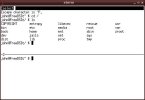Your posts are always informative and i appreciate you taking time out of your day to help a newbie. I try to learn something new everyday on FreeBSD. I really love this system. I feel like Unix-like environment is true computing and the freedom of a bare-bones system is so refreshing.
Thank you. That's what I'm trying to do: I cannot give the help the hackers, gurus, developers, and pros I see here a lot provide. But since I am a FreeBSD exclusive
user (okay, not 100.0% exclusive. I play some
old ancient 90s games on XP under VB) I want to share my good experiences I have with FreeBSD, and I try to convince newbies to give FreeBSD a shot. And maybe (of course with others [thanks to all for any adding, or correcting annotations at this point!

]) to give some advice, how to get into this system as quickly and comfortable as possible (so maybe to relieve the gurus.) Which, if we both look back we had with our (and also including others again) first posts under
FreeBSD or Linux from Windows, seemed to work.

But I will, 'cause I only can, give you general advices, only, 'cause since when I read your posts between the lines right, in some points you already overtook me

You may a newbie to unix-world, but you're for sure no computers noob!
(high time to get you on the right horse

[...
Windows...

])
Which brings me to
I am satisfied with this system but it will cost time to catch up to regular users/experts.
You don't have to
catch up. This ain't a competition.
You cannot learn everything. To even get close takes (many) years.
But that's not the target.
Using it is. That's what it's for.
Know what you want to do with the machine (which for many already is a hard task), knowing what can be done, pick from that what is of use or interest to you, and just
do it. Learn how to accomplish certain tasks you pick is what the game is all about. (Okay, maybe if you want or need to earn money with it you may need to learn some things more.)
Anyway you will learn pretty much if you just use it, and be open to another not-Windows-world.
What you proved you are.

I didn't told you the best part yet:
What you learn on BSDs/unix[like] is, as you also already figured out yourself, real computering. Only certain things change step by step by progress on computer science, by evolution, by sense, not because of a commercial big-tech company's marketing departement decided willfully to do so.
Many general core basics, as some mentioned in this thread, are over fifty years old. And stay. Because they are proven good, and by now no other way was found to do it better. New things are
added, only, but not willfully replaced. Only things nobody really need and use anymore for quite a time are thrown overboard (and still there are ways to have or get them back anyway.) especially not unannounced, nor willfully to force to use the new ways, only.
So:
Learning is really worth the effort.
Gained knowledge is not endangered to be dropped into the garbage everytime a new version is released. Anything you learn in unix[like]-world is an useful investement.
Eventually one day you will realize:"Damned, I became pretty good" - when you already are long by than.
Short:
Becoming good ain't the target. This will happen automatically just by using, and loving it. What you already do.
I know that i can browse ports but i usually only install pre-compiled packages from the repository.
That's good. But in general what is in ports you get as packages, too. So what I ment was: Browse the ports tree for to see what's all available (it's a
lot), for maybe something interests you.
Then install the according package.
we are really down to Firefox on FreeBSD? I'm struggling to find alternatives.
Search the forums! There already are some threads discussing that exact topic, suggesting several browsers. (you sometimes get quicker and better results using
duckduckgo.com for search on FreeBSD forums, than using the forum's internal search.)
Besides several documentations besides
The Handbook, like
The Wiki, your local
file:///usr/local/share/doc/,
The Mailing Lists (pick and subscribe to some e.g. security to get informed in time about security issues, and how to solve them) and several personal blogs on FreeBSD, and other documentation,
The Man Pages, and this forums are a
gold diamond mine, you just need to dig.
(since this is an open, public forum any one can read without being logged in, I also always try to give general answers anybody may have a use for, not the OP, only - so I may give information you already knew

)
Enjoy! (your weekend, FreeBSD, your life with your wife, and your kids!)

